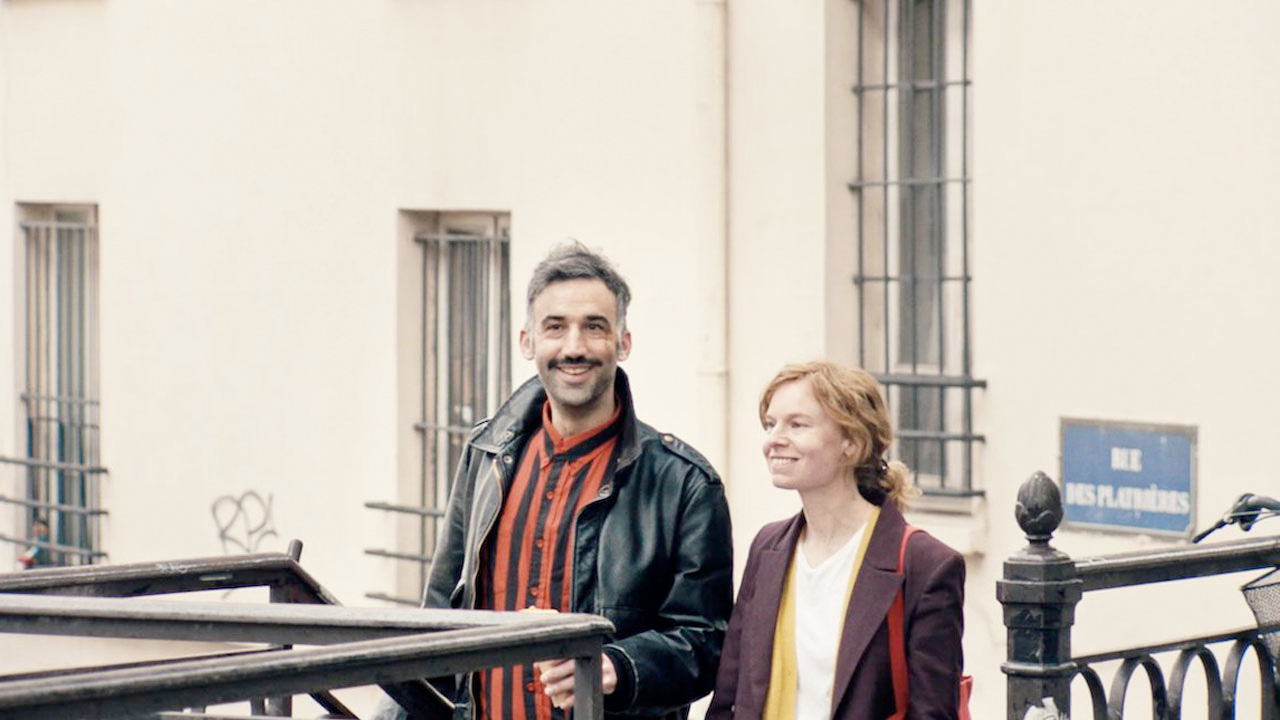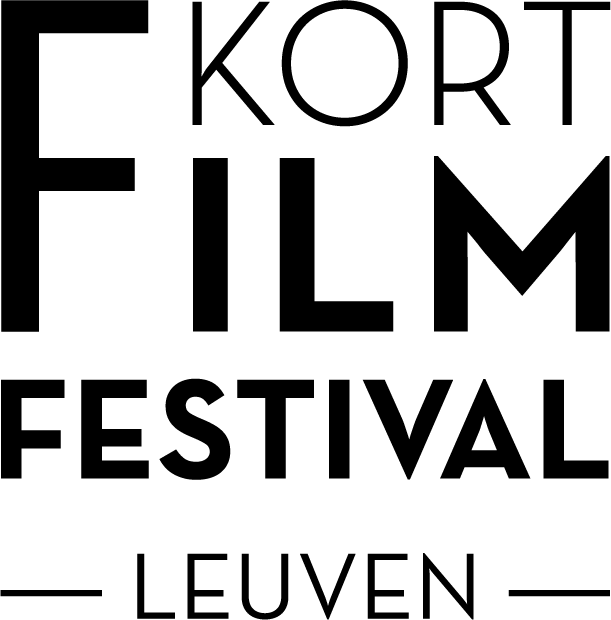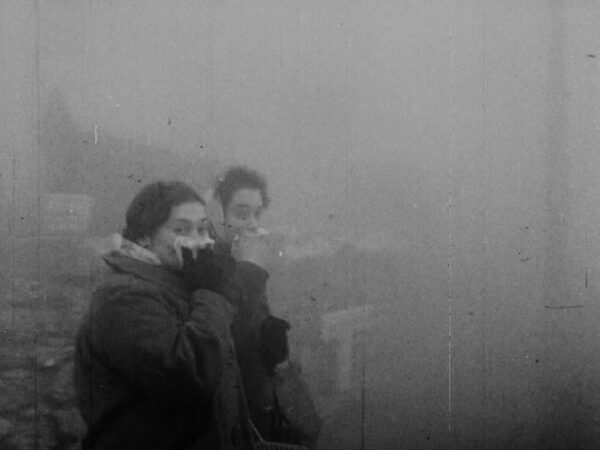Joie De Vivre?
Je veux déguster
French actor-director Léo-Antonin Lutinier’s debut short film guides us through beauty and destruction without judgement.

“Je travaille, pour faire chaque jour un jour passionnant.” Living life passionately, what does that actually mean? When we spend an entire night and day in the company of a protagonist like Antonin, we might come close to grasping it. He lives his life like it’s a Jacques Demy film; breaking out in song and dance whenever it suits him, trying to solve lovers’ spats with a simple kiss.
Je veux déguster is a debut short film by French actor-director Léo-Antonin Lutinier, who also plays Antonin, the main character. Lutinier started out as an actor and performer across shorts and feature films, theatre and musicals, with genres ranging from comedy to thriller, drama, and mystery. With Je veux déguster, one gets the feeling that it’s quite a personal story because of the enormous empathy shown towards a rather ambivalent protagonist. We follow Antonin, a man so passionate about life that he can’t help but hurt the people around him. He has a best friend, Seb, and a girlfriend Sarah, both of whom support him, even when it has negative effects on their own lives. When Sarah just can’t take it anymore, Antonin’s passion morphs from endearing to dangerous.
From the first scene, the tension between the character and his environment is clear; even his dancing in the streets is enough to annoy the people around. One evening, three men at a café seem to take his moves as personally offensive; though their faces are blurry, you can feel their disapproval and homophobia seeping through. Even after getting beaten up, pinned to the wall, and locked up, Antonin still seems like he’s fluttering through life, cracking jokes to the police officer guarding him. This free-flowing kind of existence reminds me of a favourite quote from Friedrich Nietzsche’s “Thus Spoke Zarathustra”, where he writes that “…the butterflies and soap bubbles, and whatever is like them among us, seem most to enjoy happiness.”
In the jail cell scene, in which the humour feels reminiscent of mainstream French comedies like Taxi, we already catch a glimpse of how Antonin’s joie de vivre could take a darker turn: he snatches the police officer a little too tight and kisses him on the lips. He oversteps his boundaries, to say the least. But unfortunately, life is not a Jacques Demy film. Going by the film’s colour palette, Antonin’s world may not be a brightly coloured one, but it feels oh-so-close and oh-so-real. And even though he might move through life like a soap bubble, the world comes at him like a thousand needles.
Is he mentally ill? Or is it the world that’s ill? You come to ask yourself: Wouldn’t life be more fun if we could all live so vigorously, detached from the conventions that apparently come with being alive? Being passionate about life itself is not something that seems to be rewarded in our society. On the contrary, it often makes life harder. You can be passionate about your life, but not too much. You should direct your passion elsewhere; your job, gaining wealth, beauty, materialistic things, such as a fancy bath with a brass shower head.
When we first meet Antonin’s girlfriend Sarah, we see them attending to exactly this need–they are in a furniture store, discussing the purchase of a new bathtub. The salesman seems like the exact opposite of Antonin; someone so obsessed with being good at his job, that it has become his main character trait. As Sara talks prices with the sales assistant, they are both oblivious to what’s happening behind them, but we, as spectators, see the big picture. In the background, we have an example of how much Antonin’s world differs from ours. Where we might see a bathtub, he sees a swimming pool. A stool becomes a diving board, black duct tape for his DIY swimming trunks and cap, and the water dispenser turns into a shower. You can’t help but look up to his inventiveness and smile.
The salesman, however, is in no way amused or impressed, already freaking out about how he’ll explain this to his boss, not realising that what has happened is not the worst thing; it’s actually nothing more than a wet floor. We meet a lot of people like this in life, who think that colouring outside the lines is a crime in and of itself, and that’s why Antonin’s joie de vivre feels so refreshing to watch. But to live life like this is also a privilege, especially when considering the toll it takes on others and their indispensable support. Even more so, a strong passion like Antonin’s can dim that of those who are constantly tasked with being responsible for him. His girlfriend even asks him, “When will I ever be able to take a risk?”
In one sequence, they’re walking down the street, and we catch a glimpse of Sarah’s own ‘passion for life’; she seems to love playing along with his performance, walking in slow motion unbothered by the world around them. But when they try to cross the road like that, and multiple cars start honking aggressively, she immediately snaps out of it. He, on the other hand, doesn’t, but he can afford to. As Sarah shouts at him to walk faster, we see the crack between them deepen. She doesn’t have the privilege to stay in this fantasy world, having to take responsibility for both of their lives.
What follows is a heartfelt breakup scene, with a couple of jazz musicians on the street providing a surprisingly soothing soundtrack to a painful set-up. Although for most of the film, the camera has kept its distance, here we get a shot that brings us incredibly close to both Sarah and Antonin. After a stable long take fixed on Sarah, as she explains how this relationship has affected her life, the scene cuts to him, standing opposite, as he starts singing opera in response. In a protracted, sad fashion, the camera slowly pans from Antonin over the musicians, then back to Sarah. On her face, we see her pain and the realisation that he’s never going to change. That she must leave in order to save herself. The camera pans back from her past him, revealing in a full circle that Sarah has already gone. Antonin is still standing there, singing, while the world around him has just gotten darker.
Following this scene and throughout this second half of Je veux déguster, it gets easier to realise that the protagonist’s passion for life goes beyond; it’s a disease, an addiction, and it’s stronger than himself. Although the narrative structure of the film and much of its visual style is not particularly innovative, it still manages to distinguish itself thanks to its central performances and the way it combines humour and drama, light and darkness. The ending sees Antonin checking himself into a psychiatric hospital, and such an artistic decision unfortunately takes away from the film’s ambiguity towards its protagonist. It can be read as a clear statement that it is Antonin who needs to change, not the world around him.
Still, Je veux déguster guides us through this night and day of beauty and destruction without judgement. Could you actually even judge a soap bubble for floating through the air? Not really, because you know it has no choice.
This text was developed during the European Workshop for Film Criticism #3—a tandem workshop set during Kortfilmfestival Leuven and Vilnius International Short Film Festival—and edited by tutor Savina Petkova.
The European Workshop for Film Criticism is a collaboration of the European Network for Film Discourse (The END) and Talking Shorts, with the support of the Creative Europe MEDIA programme.







There are no comments yet, be the first!